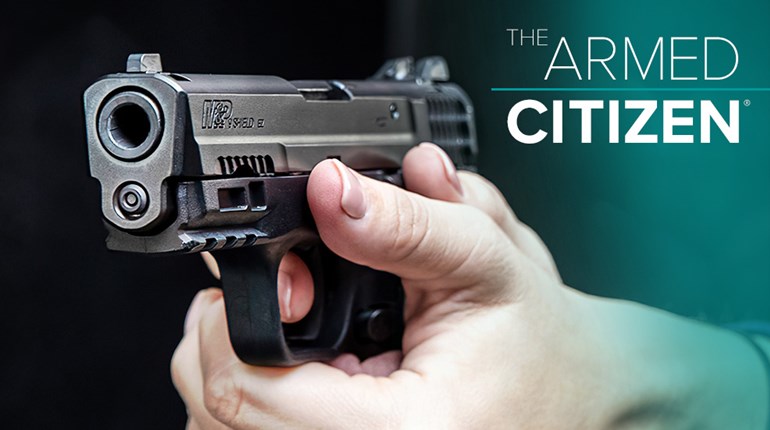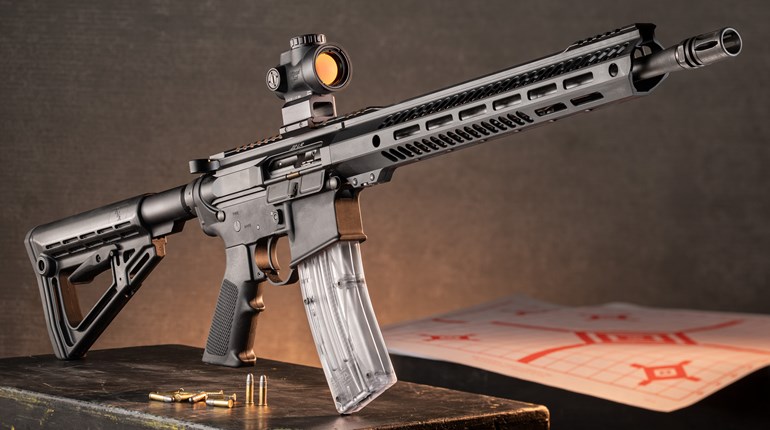
The cell towers surrounding the prison weren't there to provide service, but to deny it.
The maximum security facility at Ciudad Barrios, in a remote corner of El Salvador, is home to many of the leaders of the notorious gang MS-13. NRATV asked us to go to Latin America to report on the gang and its members. Hyper-violent and known for tactics that would make an ISIS executioner look like an amateur, there are currently thousands of Maras behind bars in El Salvador, and tens of thousands who are not in prison. The government there has already designated them a terror organization (though the U.S. has yet to officially designate them so). The gang has de facto control over much of the country, and battles over turf with the rival 18th street gang contribute heavily to the designation of El Salvador as one of the most violent places in the world, with a murder rate three times higher than Mexico.
But the El Salvadoran gang didn’t start here. It started in Los Angeles in the 1980s.
Some 25 years later, the gang has matured into what the U.S. State Department calls a Transnational Criminal Organization. They run drugs, they traffic in human beings. They've been known to meet with terror groups like Al Qaeda. And in El Salvador, they charge “la renta”—protection money—from at least 70 percent of businesses in areas they control, from buses and taxis to the tiny kiosks selling savory grilled pupusas on the street.
For all that, they aren’t very well funded in the greater scheme of things—not on the level of ISIS or some of the Mexican cartels. But what they lack in cash, they make up for in sheer numbers and audacity—with some 70,000 members spread across Latin America, the Caribbean, most large U.S. cities, Toronto, and even some in Europe.
They are loosely led, but tightly bound by a code of conduct. “Kill, Rape, Control” is their motto.They are loosely led, but tightly bound by a code of conduct. “Kill, Rape, Control” is their motto. They are notorious for their ghastly tattoos, oftentimes completely covering faces, backs and torsos—a way of making sure that members are “marked for life” in a very literal way.
My intrepid field producer Dennis and I traveled to El Salvador to learn more about this gang that has been in the news so much lately. What we found was both sad and terrifying.
Our first destination was Ciudad Barrios, a sleepy mountain village only a few miles from the Honduran border. The city rarely sees tourists, which probably explained why Dennis and I got stared at everywhere we went as if we were a pair of giraffes walking through town. It’s a nice place, such as it is. Quiet, humble and surrounded by lush coffee plantations as far as you can see. At first glance the most dangerous part of being there seemed to be the shower in our $18-a-night hotel. But under the surface, things are quite different.
Chatting with people on the street (I’m a fluent Spanish speaker), whenever I brought up the pandillas, or gangs, people would look furtively around and say, “That’s a delicate subject.” If I could get them to talk at all, they would tell me the gangs control everything in town.
We spoke with the mayor, who told us, “if you don’t bother them, they won’t bother you.” He then went on to explain how the gang sets up road blocks to shake down everyone who passes by. “If they ask you for $10, you give them $10,” he shrugged. The price of peace. Not life threatening, just don’t get on their bad side. One police officer I spoke to said he works in internal affairs investigating corruption within the police force. He’d received death threats targeting himself and his family. He sent his family to live in the United States and hopes to join them as soon as possible.
The Ciudad Barrios prison sits just outside of town, surrounded by high walls topped with concertina wire. Soldiers in face-hiding balaclavas stood guard in sandbagged bunkers outside the prison. I’d heard that there are no guards inside the walls. The prison is dedicated solely to the most dangerous members of MS-13. Inside, the gang runs everything. When I approached the front door of the prison and spoke to the soldiers on the outside, not only did they confirm what I’d heard about the guards, but they said MS-13 pretty much controlled everything outside the walls as well. The prison holds several of the men who are considered to be “kingpins” of MS-13. It’s said they can put out a hit on someone 4,000 miles away in North Carolina, and within hours that person will die.
It’s said they can put out a hit on someone 4,000 miles away in North Carolina, and within hours that person will die.Hoping to get a tour, I had contacted the directorate in charge of El Salvador’s penal system before our trip, and had been working on nailing down an interview with the director himself. The day we arrived in El Salvador, however, I picked up a newspaper and saw that the director had just been arrested for embezzling over $5 million from the inmates under his charge. I can’t imagine what his prison experience will be like if he’s convicted. So I wasn’t expecting much when we approached the prison at Ciudad Barrios. I got even less. A tiny window opened in the large metal door, and a man with his face covered told me nobody was allowed inside the prison, but politely scribbled down a number and suggested I call the director of prisons. Ha ha.
I called the number anyway. Why not? Surprisingly, someone answered and promised to “see what I can do,” and call me back in a few hours. Even more surprisingly, he actually called me back. To my astonishment, he scored me an interview with the new acting director of prisons.
We hurried to the office and got there with minutes to spare. The new interim director looked understandably like a drowning man who has just been offered a bottle of water instead of a life vest. Once we got him talking though, he opened up and became very animated as he explained the challenges he faced.
“The gangs are very strong,” he began. “MS-13 and Calle 18 … It has gotten to the point where we have to separate them in their own dedicated prisons to keep war from breaking out.”
The penal system has put a lot of thought and effort into finding a way to actually rehabilitate the inmates. They instituted a plan called “Yo Cambio” which means “I change.” It’s a holistic program of education, health, spiritual and mental fitness, and work that aims to actually change the hearts and minds of the men who go through the program.
The mayor of Ciudad Barrios, a kind-faced man named Heris Romero, believes the best way to fix the problem is to reach the kids before they join the gang.I was surprised to find that a significant number of gang members never learned how to read. It turns out El Salvador has a similar problem to what the U.S. experiences in many inner cities, where fatherlessness leads to gang membership, which leads to violence. Yo Cambio aims to reverse the damage as much as possible.
The mayor of Ciudad Barrios, a kind-faced man named Heris Romero, believes the best way to fix the problem is to reach the kids before they join the gang. Indeed, prevention is always better than a cure. But when the mayor took us to see one of his initiatives at a local coffee farm, the reality of the problem raised its ugly head.
The event was supposed to be a celebration of world environment day at the local coffee farm. They had arranged for school children to be bused in for a field trip to tour the processing facility. When we arrived, the first thing I noticed were the armed guards, toting ancient street sweeper shotguns. I asked why a coffee farm needed guards. The owner said the gangs will actually steal truckloads of coffee. Later we found out the kids couldn’t make it.
It turns out there were bandits controlling the road outside of town, and bringing the kids in would have been too dangerous.
Such is life today in El Salvador. Which explains, perhaps, why thousands of mothers have put their unaccompanied children on trains for the dangerous ride north into the United States. But not all of the "unaccompanied minors" are actually kids. Many turn out to be teenaged gang members taking advantage of the Obama administration's lax immigration policy to establish their networks throughout the United States. Today the State Department claims MS-13 has a presence in over 200 cities across the United States. Rooting out these networks has become a major priority for the Trump administration. Thousands of Maras are being rounded up and deported, something that greatly concerns the government of El Salvador.
As these gang members return, further violence is likely, which could only exacerbate the violence here. Salvadoran President Sanchez Ceren is responding by hiring more police. But a million more cops won't solve the problem, only treat it.

That's why Mayor Romero is working so hard to reach the kids with educational opportunities. To give them options.
As Dennis and I enjoyed a nice dinner overlooking the quaint town square in Ciudad Barrios, a dirty little boy of about 10 stepped in. His hair was unkempt and his toes were sticking out of his shoes. He put his hand to his mouth and pleaded with us for the scraps from our meals. Here was the kind of kid the mayor was talking about.
If there's anything I've learned while doing this job for 15 years, it’s that you can't help everyone, but you can help someone. So the boy went away with a hot meal to go and a bag full of groceries to boot. I figured he'd run right home. But we watched as he scampered over to a park bench in the town square and began to eat with his fingers. Before too long there were two much younger children at his side, and my heart swelled as I watched him happily share his food with the other little ones.
If only there was a way to help them all.


































